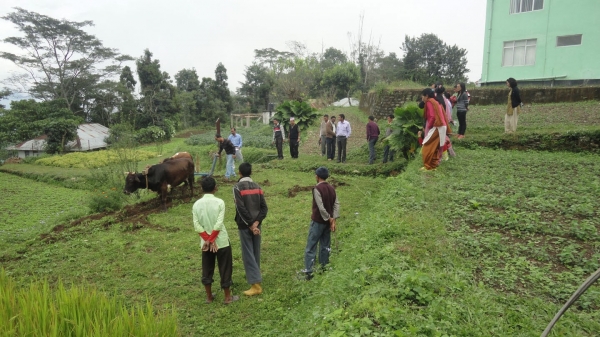ANIMAL POWER IN AGRICULTURE
----------------------------------
A working animal is an animal, usually domesticated, that is kept by humans and trained to perform tasks. They may be close members of the family, such as guide or service dogs, or they may be animals trained strictly to perform a job, such as logging elephants. They may also be used for milk, a job that requires human training to encourage the animal to cooperate. Some, at the end of their working lives, may also be used for meat or other products such as leather. Such animals are sometimes called draft animals or beasts of burden.
The history of working animals may predate agriculture, with dogs used by our hunter ancestors. Around the world, millions of animals work in relationship with their owners. Domesticated species are often bred to be suitable for different uses and conditions, especially horses and working dogs. Working animals are usually raised on farms, though some are still captured from the wild, such as dolphins and some Asian elephants.
People have found uses for a wide variety of abilities found in animals and even in industrialized society many animals are still used for work. The strength of horses, elephants and oxen is used in pulling carts and logs. The keen sense of smell of dogs and, sometimes, rats are used to search for drugs and explosives as well helping to find game while hunting and to search for missing or trapped people. Several animals including camels, donkeys, horses and dogs are used for transport, either riding or to pull wagons and sleds. Other animals including dogs and monkeys provide assistance to blind or disabled people.

Animal PowerOn rare occasions, wild animals may be not only tamed, but trained to perform work, though often solely for novelty or entertainment purposes, as such animals tend to lack the traits of trustworthiness and mild temper that characterize the true domesticated working animal. Conversely, not all domesticated animals are working animals. For example, while cats may perform work catching mice, it is an instinctive behavior, not one that can be trained by human intervention. Other domesticated animals, such as sheep, or rabbits, may have agricultural uses for meat, hides and wool, but are not suitable for work. Finally, small domestic pets such as most birds (other than certain types of pigeon) or hamsters are generally incapable of performing work other than that of providing simple companionship.

